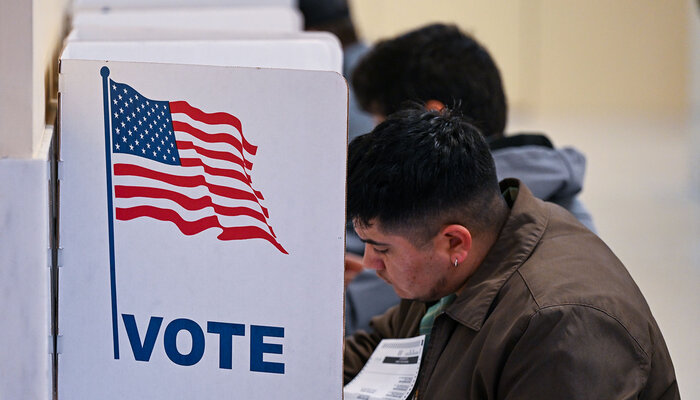Ohio: Limits on Voter Eligibility Challenges
This resource details state and federal laws that guard voters against unfounded challenges to their eligibility.
Written and published in partnership with All Voting is Local, with special thanks to Jenner & Block, LLP
Ohio, like most states, allows challenges to individual voter registrations before and during an election. This resource details state and federal laws that govern this process and protect challenged voters. Ohio’s voter protections include a requirement that a voter who challenges another voter attest to the truth of their allegations under penalty of election falsification, and that only poll workers can make Election Day challenges.
Before an election, registered voters challenging another voter’s registration must do so on an official form, under penalty of a felony, no later than 30 days before an election.
- Only registered voters may challenge another voter’s registration, and must submit a state form to the board of elections no later than 30 days before an election. footnote1_-X8PEbZkehhz671dcgOAUCsPWLmX-TQMYR0iAly-8_sOKpAgYyWaA61 Ohio Rev. Code Ann. §§ 3503.24(A), 3599.36; Ohio Secretary of State, Election Official Manual, December 20, 2023, 130, https://www.ohiosos.gov/globalassets/elections/directives/2023/eom/eom_fullversion_2023–12.pdf; https://www.ohiosos.gov/globalassets/elections/forms/257.pdf, March 2019. The form must be signed under penalty of election falsification, a fifth-degree felony. footnote2_QsVqA2fZde6KhvEAA9ysz1X61y-QembHMq4qV6E4aQ_zYAkK0YCjtia2Id.
- A challenge cannot be granted based on returned mail marked undeliverable or unable to forward, changes of address on file, evidence of a foreclosure action, or the fact that a voter’s status is recorded in the Statewide Voter Registration Database as “active-confirmation” or “inactive.”footnote3_tUfFT2–5z0ltbQt2ZtcPXy6Doy8d5PhTDjZaKYtf8Q_y49iV267qpew3 OH Secretary of State, Election Official Manual, 130–32.
- If the challenge form states facially sufficient reasons to disqualify a voter and the board is not able to determine from its records whether the challenge should be denied or granted, the challenged voter is entitled to a hearing at which they have the right to be represented by counsel, call witnesses, and have the board subpoena witnesses on their behalf. footnote4_qe2Kci0nfbdRzFdNi1KEAsTDijgBAYRTSzZzrb8qdzM_ygxBvlfoSKMY4 Ohio Rev. Code Ann. § 3503.24(B); OH Secretary of State, Election Official Manual, 131.
The board of elections must promptly set a time and date for a hearing no more than 10 days from when the challenge was submitted. The challenged voter must be notified no less than three days before the hearing. footnote5_QYc25sBxZ7rPse1Gk-GxosjLnlXhDDapGiL16q3Vc_qFRfyFEEPBrD5 Ohio Rev. Code Ann. § 3503.24(B).
Only precinct election officials may challenge a voter on Election Day and only on a limited basis.
- Only precinct election officials may challenge voters at a polling location on Election Day, and only on the grounds the voter is not a U.S. citizen, an Ohio resident who has resided in the state for 30 days immediately preceding the election, a resident of the precinct, or of legal voting age. footnote6_0lvOCQxniWwqMGGaYvYZPZs1LMCi08o64a192bfYLk_eznkNLgfuarB6 Ohio Rev. Code Ann. § 3505.20. Similarly, only election officials may challenge absentee ballots. footnote7_jSLbeQI-XZntrTxJT68rQUyRRwHydGFy0SRkhbs6iw0_yxVZqfgY6B307 Ohio Rev. Code Ann. §§ 3509.06–07.
- The challenged voter will have the opportunity to answer the challenge by completing Ohio Secretary of State Form 10-U. footnote8_vsJqMUA89Z0EupsZKw-BMkT1pZ7u9zDc4AwbtqhvBTE_a8c07tsHmvlQ8 OH Secretary of State, Election Official Manual, 272; OH Secretary of State, “Affidavit-Oath-Examination of Person Challenged Form No. 10-U,” last accessed May 21, 2024, https://www.ohiosos.gov/globalassets/elections/forms/10-u.pdf.
If a majority of the precinct election officials are able to determine that the voter is eligible, the voter must be given a regular ballot. If a majority finds the voter is ineligible, or if the voter does not complete Form 10-U, the voter must be given a provisional ballot. footnote9_0lvOCQxniWwqMGGaYvYZPZs1LMCi08o64a192bfYLk_vffdNoUWHjRH9 Ohio Rev. Code Ann. § 3505.20.
Almost no challenge should result in the immediate removal of a voter from the rolls.
The National Voter Registration Act limits when and how voters can be removed from the rolls. Under the act, states and counties are permitted to remove a voter in just five circumstances: if the voter affirms the change; if state law requires, for a criminal conviction or mental incapacity; for the death of the voter; if the voter confirms a change of residence in writing; and based on other evidence of a change of residence, but only after the state sends a notice and the voter both fails to respond and fails to vote in the next two federal general elections. footnote10_La3sQLleUzN5Ang4JpfFCrW5bh3IlqeLz9p8sVmuK3k_t4ca8iEiCYe210 52 U.S.C. §§ 20507(a)(3), (a)(4), (d). These restrictions apply regardless of whether clerks are conducting their own list maintenance or responding to challenges.
The act also prohibits the “systematic” removal of voters within 90 days of a federal election. footnote11_fQatbBIPG32IaIjbWu-a3c-dBiH0T-Q9n5VsyJj36w_vfsF919FIrk111 52 U.S.C. § 20507(c)(2)(A). According to guidance from the U.S. Department of Justice, “This 90-day deadline applies to State list maintenance verification activities such as general mailings and door-to-door canvasses. This deadline also applies to list maintenance programs based on third-party challenges derived from any large, computerized data-matching process.”footnote12_r-3M57p4O7mfrO8BqBJLLUlLlFUNcxePJSgNCg2kv2o_eoYvszhTyI1b12 U.S. Department of Justice, Voter Registration List Maintenance: Guidance under Section 8 of the National Voter Registration Act, 52 U.S.C. § 20507, 4, September 2024, https://www.justice.gov/crt/media/1366561/dl.
• • •
Voters in Ohio have the right to vote free from intimidation under federal and state law. Only an election official can challenge an individual’s right to vote at the polls, and election officials must protect voters from intimidation or interference. footnote13_ruxFvhJsDtjBLnyHxGAvitudtQlTb1W3oM0mifHXNb4_uxk9Z6XUmwwM13 Ohio Rev. Code Ann. § 3501.33. More information on the federal and state laws that protect Ohio voters from intimidation can be found here.
End Notes
-
footnote1_-X8PEbZkehhz671dcgOAUCsPWLmX-TQMYR0iAly-8_sOKpAgYyWaA6
1
Ohio Rev. Code Ann. §§ 3503.24(A), 3599.36; Ohio Secretary of State, Election Official Manual, December 20, 2023, 130, https://www.ohiosos.gov/globalassets/elections/directives/2023/eom/eom_fullversion_2023–12.pdf; https://www.ohiosos.gov/globalassets/elections/forms/257.pdf, March 2019.
-
footnote2_QsVqA2fZde6KhvEAA9ysz1X61y-QembHMq4qV6E4aQ_zYAkK0YCjtia
2
Id.
-
footnote3_tUfFT2–5z0ltbQt2ZtcPXy6Doy8d5PhTDjZaKYtf8Q_y49iV267qpew
3
OH Secretary of State, Election Official Manual, 130–32.
-
footnote4_qe2Kci0nfbdRzFdNi1KEAsTDijgBAYRTSzZzrb8qdzM_ygxBvlfoSKMY
4
Ohio Rev. Code Ann. § 3503.24(B); OH Secretary of State, Election Official Manual, 131.
-
footnote5_QYc25sBxZ7rPse1Gk-GxosjLnlXhDDapGiL16q3Vc_qFRfyFEEPBrD
5
Ohio Rev. Code Ann. § 3503.24(B).
-
footnote6_0lvOCQxniWwqMGGaYvYZPZs1LMCi08o64a192bfYLk_eznkNLgfuarB
6
Ohio Rev. Code Ann. § 3505.20.
-
footnote7_jSLbeQI-XZntrTxJT68rQUyRRwHydGFy0SRkhbs6iw0_yxVZqfgY6B30
7
Ohio Rev. Code Ann. §§ 3509.06–07.
-
footnote8_vsJqMUA89Z0EupsZKw-BMkT1pZ7u9zDc4AwbtqhvBTE_a8c07tsHmvlQ
8
OH Secretary of State, Election Official Manual, 272; OH Secretary of State, “Affidavit-Oath-Examination of Person Challenged Form No. 10-U,” last accessed May 21, 2024, https://www.ohiosos.gov/globalassets/elections/forms/10-u.pdf.
-
footnote9_0lvOCQxniWwqMGGaYvYZPZs1LMCi08o64a192bfYLk_vffdNoUWHjRH
9
Ohio Rev. Code Ann. § 3505.20.
-
footnote10_La3sQLleUzN5Ang4JpfFCrW5bh3IlqeLz9p8sVmuK3k_t4ca8iEiCYe2
10
52 U.S.C. §§ 20507(a)(3), (a)(4), (d).
-
footnote11_fQatbBIPG32IaIjbWu-a3c-dBiH0T-Q9n5VsyJj36w_vfsF919FIrk1
11
52 U.S.C. § 20507(c)(2)(A).
-
footnote12_r-3M57p4O7mfrO8BqBJLLUlLlFUNcxePJSgNCg2kv2o_eoYvszhTyI1b
12
U.S. Department of Justice, Voter Registration List Maintenance: Guidance under Section 8 of the National Voter Registration Act, 52 U.S.C. § 20507, 4, September 2024, https://www.justice.gov/crt/media/1366561/dl.
-
footnote13_ruxFvhJsDtjBLnyHxGAvitudtQlTb1W3oM0mifHXNb4_uxk9Z6XUmwwM
13
Ohio Rev. Code Ann. § 3501.33.




